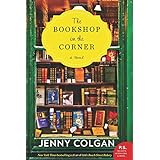Taking us inside the writing and publishing business right before the 2008 financial meltdown, McInerney drops so many literary names and references that some might accuse him of being pretentious. But I loved reading about the behind-the-scenes machinations that result in a published book. Especially well-done and realistic is Russell's discovery of a "fresh new voice in fiction." Jack is an unpolished kid from the south whose undisciplined work shone under Russell's editing, a young man whose success went to his head as quickly as his star faded.
McInerney says that New York is really just a small town where everyone knows everyone, and the city, from Soho to Harlem, is a major character in this book He conjures up the very essence of what it's like to live among, yet on the fringes of the 1%, the endless fund raisers, charity parties, openings, screenings, benefits. He pulls us into that life, shallow and exhausting, and mesmerizes us with the rich tapestry of lives lived on the edge of the precipice.
Yes, they made it through the sex, drugs, and rock and roll days, for which there's little nostalgia. Now, will they survive the indignities of middle age and the looming financial crisis? Obviously pulling on his own thoughts about aging, McInerney depicts couples in middle age, rethinking their marriages, contemplating (and often having) affairs, grasping at those last ditch efforts to stave off boredom even if it means downing a Cialis with your $1500 bottle of Bordeaux.
And yet, ever the generous writer, McInerney forgives Corinne and Russell, Washington and Veronica, Tom and Casey their vanities, their deceptions that mean so little in the overall scheme of things. There is much love and respect among these couples. They have histories that are worth preserving. There's a wonderful scene on the evening of the 2008 presidential election when the long time friends and their teenage kids sit together watching the news results roll in from the various TV stations, learning that Barack Obama will be the next president of the United States.
The champagne corks pop, the sense of hope in the future is palpable. We realize that these couples, these friends, will probably make it. I remembered my friend Don and I popping our own champagne that night here in Florida, calling my sister in Massachusetts, and I felt nostalgic for those bright, precious days. That's what a good writer can do for you.




